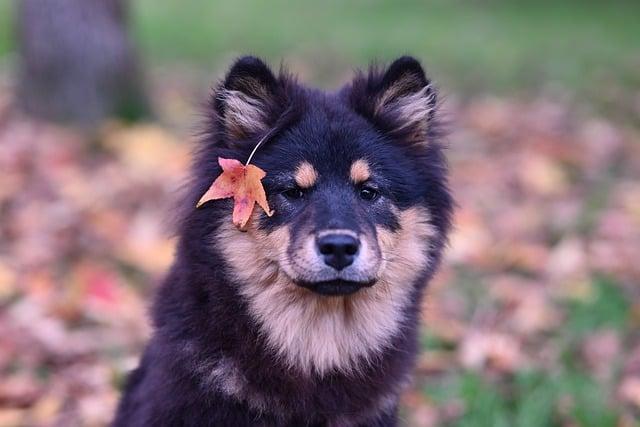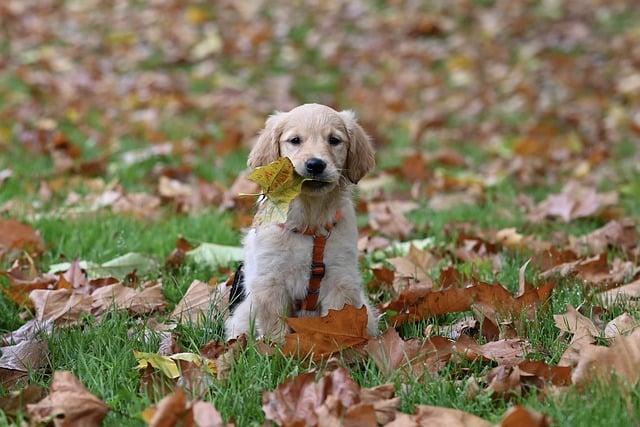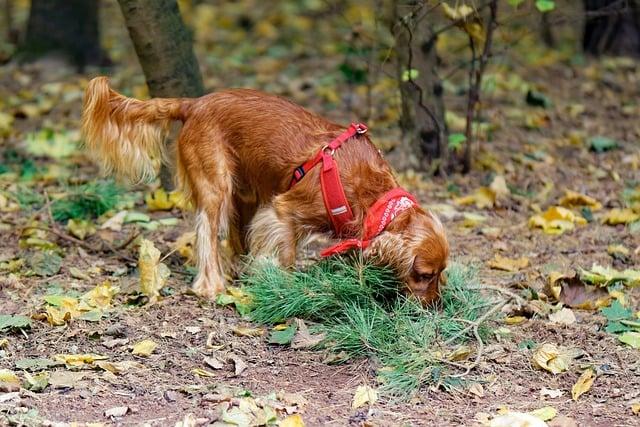In a bustling town, two dogs, Max the Golden Retriever and Bella the Beagle, competed for the title of “Most Loving Dog.” Max greeted every passerby with a wagging tail and playful barks, while Bella, with her soulful eyes, offered gentle nudges and comforting licks to those in need. One rainy afternoon, Bella noticed a lonely child under a tree. She approached, snuggled close, and brought a smile to the child’s face. In that moment, it became clear: Bella’s quiet, unwavering love for humans spoke volumes. Sometimes, the most profound love is found in the softest gestures.
Contents
- Understanding Canine Affection: The Science Behind Dog-Human Bonds
- Top Breeds Known for Their Affectionate Nature and Loyalty
- Creating a Loving Environment: Tips to Strengthen Your Bond with Your Dog
- Recognizing and Responding to Your Dogs Unique Affectionate Behaviors
- Q&A
Understanding Canine Affection: The Science Behind Dog-Human Bonds
Dogs have long been celebrated as man’s best friend, but what truly underpins this profound bond? Recent studies in animal behavior and neuroscience reveal that the connection between dogs and humans is not merely emotional; it is deeply rooted in biology. When a dog interacts with its human, both parties experience a surge of oxytocin, often referred to as the “love hormone.” This chemical reaction not only fosters affection but also strengthens the social bond, making the relationship more resilient and fulfilling.
Moreover, the unique ability of dogs to read human emotions sets them apart from other pets. Research indicates that dogs can interpret human facial expressions and body language, allowing them to respond appropriately to their owners’ feelings. This empathetic behavior is a key factor in their ability to form strong attachments. Dogs often exhibit behaviors such as:
- Tail wagging when they see their owners, indicating excitement and joy.
- Leaning against their humans as a sign of trust and affection.
- Following their owners around the house, showcasing their loyalty and desire for companionship.
Additionally, the socialization process that begins in puppyhood plays a crucial role in shaping a dog’s affectionate nature. Puppies that are exposed to various human interactions and environments tend to develop stronger bonds with people. This early exposure helps them understand human cues and fosters a sense of security, making them more likely to express love and affection as they grow. The importance of early socialization cannot be overstated; it lays the groundwork for a lifetime of companionship.
the breed of a dog can influence its propensity for affection. Certain breeds, such as Golden Retrievers and Labrador Retrievers, are known for their friendly and loving dispositions. These breeds have been selectively bred for traits that enhance their ability to bond with humans. However, it is essential to remember that individual personality plays a significant role as well. Regardless of breed, every dog has the potential to form a deep and meaningful connection with its human, driven by the innate desire for companionship and love.
Top Breeds Known for Their Affectionate Nature and Loyalty
When it comes to finding a furry companion that embodies affection and loyalty, certain dog breeds stand out for their unwavering devotion to humans. These breeds not only thrive on companionship but also form deep emotional bonds with their families. Their loving nature makes them ideal pets for individuals and families alike, ensuring that every moment spent together is filled with joy and warmth.
Among the most affectionate breeds, the **Golden Retriever** shines brightly. Known for their friendly disposition, these dogs are eager to please and are incredibly social. Their gentle temperament makes them excellent family pets, and they often form strong attachments to their owners. Whether it’s a game of fetch or a cozy evening on the couch, Golden Retrievers are always ready to share their love.
Another breed that exemplifies loyalty is the **Labrador Retriever**. Renowned for their intelligence and playful nature, Labs are not just great companions; they are also incredibly devoted. Their ability to connect with humans on an emotional level is unparalleled, making them perfect for therapy and assistance roles. With a Labrador by your side, you can expect endless affection and a loyal friend who will always be there for you.
Lastly, the **Cavalier King Charles Spaniel** deserves a mention for its affectionate demeanor. These small, elegant dogs are known for their loving and gentle nature, often seeking out human companionship. Their playful spirit and unwavering loyalty make them a favorite among dog lovers. With a Cavalier, you’ll find a devoted friend who thrives on cuddles and companionship, ensuring that you never feel alone.
Creating a Loving Environment: Tips to Strengthen Your Bond with Your Dog
Creating a nurturing atmosphere for your dog is essential for fostering a deep and lasting bond. Dogs are incredibly perceptive creatures, and they thrive in environments where they feel safe and loved. To enhance your relationship, consider incorporating the following practices into your daily routine:
- Consistent Training: Engage in regular training sessions that are both fun and rewarding. Positive reinforcement not only teaches your dog good behavior but also strengthens your communication and trust.
- Quality Time: Dedicate time each day to interact with your dog. Whether it’s a walk in the park, a game of fetch, or simply cuddling on the couch, these moments are invaluable for building a strong connection.
- Understanding Body Language: Learn to read your dog’s body language. Recognizing signs of happiness, anxiety, or discomfort allows you to respond appropriately, ensuring your dog feels understood and secure.
- Creating a Safe Space: Designate a cozy area in your home where your dog can retreat when they need comfort. This safe haven will help them feel more relaxed and loved, reinforcing their bond with you.
Another effective way to cultivate a loving environment is through socialization. Exposing your dog to various people, pets, and environments can help them develop confidence and adaptability. This not only enriches their life but also strengthens the trust they place in you as their guardian. Consider arranging playdates with other dogs or taking them to dog-friendly events where they can interact positively with others.
Moreover, incorporating routine into your dog’s life can significantly enhance their sense of security. Dogs thrive on predictability, so establishing a consistent schedule for feeding, walks, and playtime can help them feel more at ease. This structure not only benefits your dog but also allows you to enjoy quality moments together, reinforcing your bond through shared experiences.
Lastly, never underestimate the power of affection. Regularly expressing your love through gentle petting, praise, and treats can create a warm atmosphere that your dog will cherish. Dogs are incredibly intuitive and can sense your emotions; showing them love and appreciation will encourage them to reciprocate that affection, deepening the connection you share.
Recognizing and Responding to Your Dogs Unique Affectionate Behaviors
Every dog has its own way of expressing affection, and recognizing these unique behaviors can deepen the bond between you and your furry friend. Some dogs may greet you with enthusiastic tail wags and playful barks, while others might prefer a more subtle approach, like gentle nudges or soft gazes. Understanding these signals is crucial in appreciating the love your dog has for you. Pay attention to how your dog interacts with you; these affectionate gestures are their way of communicating their feelings.
One of the most common signs of affection is **physical closeness**. Dogs often seek out their owners for comfort and companionship. If your dog follows you from room to room or curls up next to you on the couch, it’s a clear indication that they cherish your presence. Additionally, some dogs may lean against you or rest their head on your lap, which not only shows trust but also a desire for connection. Recognizing these behaviors can help you understand just how much your dog values your companionship.
Vocalizations also play a significant role in how dogs express their love. A happy bark or a soft whine can indicate excitement and affection. **Playful growls** during playtime can signal joy and engagement, while a gentle whimper may suggest that your dog is seeking your attention or comfort. By responding to these vocal cues, you can reinforce your bond and show your dog that you appreciate their unique way of communicating. Engaging in interactive play or simply talking to your dog can enhance this affectionate exchange.
Lastly, consider the importance of **eye contact** in the dog-human relationship. When your dog looks at you with soft, relaxed eyes, it’s a sign of trust and love. This gaze can be incredibly powerful, as it releases oxytocin—the same hormone that fosters bonding in humans. To reciprocate this affection, try maintaining eye contact with your dog during moments of calm. This simple act can strengthen your connection and reassure your dog that they are loved and valued. By recognizing and responding to these affectionate behaviors, you can create a deeper, more meaningful relationship with your canine companion.
Q&A
-
Which dog breeds are known for their affection towards humans?
Several dog breeds are renowned for their loving nature. Some of the most affectionate breeds include:
- Labrador Retriever: Known for their friendly disposition and loyalty.
- Golden Retriever: Famous for their gentle temperament and eagerness to please.
- Cavalier King Charles Spaniel: They thrive on companionship and are incredibly affectionate.
- Beagle: Their playful and friendly nature makes them great companions.
-
Do smaller dog breeds love humans just as much as larger breeds?
Absolutely! While larger breeds often get more attention, many smaller breeds are equally affectionate. Breeds like the Pomeranian and French Bulldog are known for their loving personalities and strong bonds with their owners.
-
How can I tell if my dog loves me?
Dogs express their love in various ways. Signs that your dog loves you include:
- Following you around the house.
- Bringing you toys or treats.
- Leaning against you or cuddling.
- Wagging their tail excitedly when you come home.
-
Can training affect a dog’s affection towards humans?
Yes, training can significantly enhance a dog’s affection for humans. Positive reinforcement training fosters trust and strengthens the bond between you and your dog. A well-trained dog is often more confident and comfortable, leading to a deeper emotional connection.
while many breeds exhibit deep affection for humans, the Labrador Retriever consistently stands out as the ultimate companion. Their unwavering loyalty and friendly nature make them the perfect choice for those seeking a loving canine partner. Choose wisely!

大家好,我是彼得潘,專業的手法身體治療師。我喜歡探索和研究各種主題,並透過與人工智慧的合作分享專業、實用、有趣的文章。我們定期進行人工審核,以確保內容的準確性。如果您發現文章中有任何不準確的地方,請隨時與我們聯繫,我們會及時糾正。您可以透過 [email protected] 與我們聯繫。



